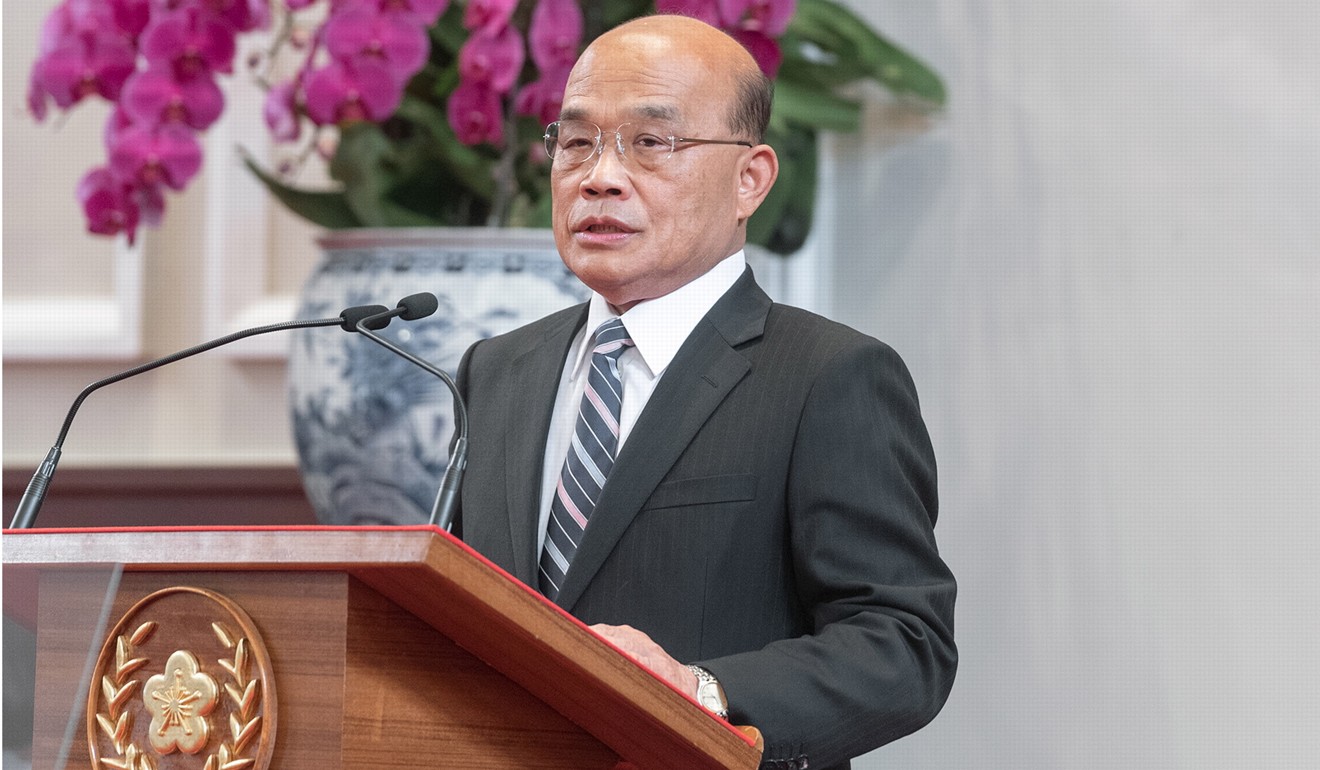
Taiwan’s new Premier Su Tseng-chang faces ‘tough task’ to help win back public trust
- President Tsai Ing-wen names 71-year-old DPP stalwart in the role after outgoing premier William Lai and entire cabinet resigns
- It comes ahead of next year’s presidential race that is likely to be fought on issues like cross-strait ties and the economy
Taiwan has named a new premier who will be tasked with helping President Tsai Ing-wen fight an uphill battle in next year’s polls amid tense cross-strait relations and fallout from the US-China trade war.
Su Tseng-chang, 71, who has previously been Taiwan’s premier and chairman of the ruling Democratic Progressive Party, was appointed by Tsai after outgoing premier William Lai Ching-te and the entire cabinet resigned on Friday.
The departure of Lai and his cabinet after the budget was passed had been widely expected following the DPP’s losses at the local elections in November.
While Su’s most important task will be to ensure that Tsai gets the party ticket for her 2020 re-election bid, observers said the veteran politician would also have to help the president regain public trust and support in a poll battle that was likely to be fought on issues like cross-strait ties and the economy.
Taiwan by-election first of many challenges for new DPP chairman
Tsai said that given Su led the cabinet between 2006 and 2007 – under then president Chen Shui-bian – he was the most suitable choice for the position. But she admitted the self-ruled island was facing a host of challenges, saying the new premier would help to deal with those problems.
“In the face of the economic impact brought by the US-China trade war and the persistent push by China for Taiwan to accept ‘one country, two systems’, Taiwan’s democracy and development are expected to face certain challenges,” Tsai said.
She added that the new cabinet would have to do all it could to continue safeguarding Taiwan and its people and develop the economy.

In response, Su said it was a crucial moment for Taiwan. “The situation is difficult and the task will be tough,” he said, adding he would work to help develop the island and win back public trust.
Tsai’s independence-leaning DPP suffered a crushing defeat in November’s local government elections, with the mainland-friendly opposition Kuomintang taking control of 15 of the island’s 22 cities and counties, including pro-independence stronghold Kaohsiung in the south.
The defeat boosted Beijing’s hopes for cross-strait unification talks, especially after the 15 KMT local government heads vowed to find ways to build economic and tourism links with the mainland.
Taiwan launches into combat training with plans for live-fire drill to fend off mainland China attack
Last week, mainland leader Xi Jinping used the 40th anniversary of the cross-strait ceasefire to end animosity to call for the island to select representatives for peaceful unification talks under the “one country, two systems” framework, with the one-China principle as the foundation.
Beijing sees Taiwan as a wayward province awaiting unification, by force if necessary. It suspended official exchanges with the island after Tsai became president in 2016 and refused to accept the one-China principle.
Tsai swiftly rejected Xi’s proposal last week, but analysts say she will not be able to avoid the issue during the 2020 presidential race.
Taiwan’s Tsai Ing-wen has torn up the 1992 one-China consensus. What does Xi Jinping do next?
Wang Kung-yi, a political science professor at Chinese Culture University in Taipei, said Su had a big job ahead of him.
“The new premier will have an important role because he has to help Tsai regain public support to get Taiwan’s house in order so that it can tackle further offensives from the mainland, including economic sweeteners and military and diplomatic threats,” Wang said.
Beijing has sought to pressure Taiwan since Tsai took office, staging war games near the island and poaching five of its diplomatic allies in a bid to force the president to accept the one-China principle. In addition, it has offered preferential treatment and measures to lure Taiwanese to move to the mainland for work.
‘A win for moderates’ in election of Taiwan’s new Democratic Progressive Party chief
The lack of cooperation between the government and legislature – seen as one reason for the November poll results – would have to change, according to DPP lawmaker Ho Hsin-chun.
“In order to win back public trust, the new premier will need to work with the legislative caucus, whose members represent the opinions of the voters,” Ho said.
But KMT lawmaker Johnny Chiang said Tsai needed to be more hands-off on domestic affairs.
“If President Tsai is not willing to give the power to the cabinet so that it can push forward its work with full force, a personnel change will do nothing to resolve the problem,” he said.
Under Taiwan’s semi-presidential system of politics, the cabinet runs the government and the president is supposed to deal only with national security, cross-strait and foreign issues. Tsai has been criticised for trying to handle issues beyond those three areas.

